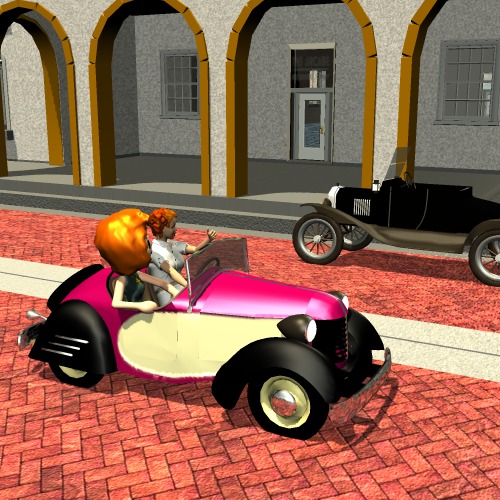Wednesday, July 23, 2008
Polistra's dream, 4
Part 4 of Polistra's Dream.
Read Part 1 and Part 2 and Part 3 first.
Ponca, June 1939.
Fran and Polistra are leaving the Arcade and driving to the lake.......

Polistra: Model T!
Fran: Yup, lots of T's still chugging along. Nowadays they're just an obstacle. Can't go faster than 40, and burn more oil than gas.
Pol: I've been thinking about Henry Ford lately. He didn't invent the car, of course, but he did invent one big idea that America has forgotten in 2008.
Fran: Mass production?
Pol: Well, he brought that to perfection, but really Henry's most important idea, the one we've forgotten in my time, is self-sufficiency.
Fran: Hmm? You'll have to explain that.
Pol: I expect it's so natural to you that it doesn't even seem like a concept. Henry Ford decided to pay his workers a living wage so that they could buy his cars, and buy other things. When the workers came from southern poverty, he trained their wives to be good housekeepers and helped educate their kids, so that their families could move up out of poverty and behave like good modern citizens. He also made sure that his company could produce everything it needed, from the raw iron for engines, to the trees for the wood bodies, to the cows for the leather seats, all the way through to the fully manufactured car. Keeping everything within the family, so to speak. That's what started America toward prosperity.
Fran: Come to think of it, that's how Mr Marland operated too. I was probably a little too hard on him the other day when I held him up as an example of ostentatious rich men. Compared to Mr Wentz he's --- I guess you'd say he's not public-minded. But Mr Marland did a lot for his employees, in the same way that Ford did. He paid them better than anyone else for the same skills, and gave them good working conditions, food and recreation. What made Ponca so prosperous and beautiful was not just the mansions he built for his own pleasure, but the houses that his refinery workers were able to buy, and the clothes that their wives could buy, and then the stores to supply the wives, and on down the line.
Pol: That whole idea has been lost. Some companies still pay well, but the self-sufficiency, the closed circle, is long gone. In the name of "freedom", department stores have been allowed to buy the cheapest possible stuff from poor countries, which puts American factories out of business. Many companies hire illegal immigrants....
Fran: Wetbacks?
Pol: Yes, wetbacks. We're not allowed to say that word. And workers smuggled in from Oriental countries. They're pretty nearly slaves, but the government winks and nods to satisfy the robber barons. An illegal immigrant can't complain about low wages and bad conditions. Worst of all, cheap phone service and cheap shipping by airplane has made it possible to run entire factories in dictatorial countries like China and Burma, where the employees are sometimes literally slaves.
Fran: Oh dear. And we went through all that trouble in Lincoln's War, all that destruction of lives and land, supposedly to end slavery. To eliminate the temptation to use unpaid labor. Pretty slick trick, I must say. Can't have slaves here, so let businessmen keep slaves outside the country. Yes, I can see why you had to get out of there. Or out of then, as the case may be.
Pol: As you say, it's a natural temptation. Businesses always want to lower their costs and increase their profits. We made it entirely too easy to use other countries where costs are lower, which means that entirely too much money is going elsewhere instead of going to American workers or other American businesses.
Fran: But what happened to Henry's big idea? I mean, it's a valid idea, so breaking the circle must lead to bankruptcy? Or did some kind of magic change prevent it?
Pol: No magic. We're heading straight down to bankruptcy. The big companies don't care, because they're so completely scattered among various nations that their American operations have become albatrosses. Magic is a good word, though. Plenty of "smoke and mirrors" to distract the people, and even to distract executives who might have known better if they'd stopped to think. Everyone was focused on stock prices, and companies decided that their single solitary goal was to increase their stock price. They stopped issuing dividends, so there wasn't even a visible measurement of real profit. Companies did whatever it took to increase the stock price, which distracted them from the more basic parts of business. They didn't care if money circulated within America to make Americans more prosperous, as long as the almighty share price kept going up and up and up.
Sorry, I got carried away.
Fran: I understand. Helps to talk about it. Not that I can do anything to stop it, since we're just inside a cartoon here.

Fran: That's Jimmy, my newsboy. Hey Jimmy! You look sort of down in the mouth. What's wrong?
Jimmy: Hi, Miss Fran. Yes ma'am. I built this fine little soapbox car but I'm not having much fun with it. I pull and pull and pull, and then I never get a chance to sit and coast.
Fran: Yeah, this part of town is flat all right. Meet my friend Polistra, who's visiting for a while.
Jimmy: Hello, Miss Lister. Glad to meet you, ma'am.
Pol: Say, I've got an idea. Let me get out of the car ...

Pol: Self-sufficiency!
Jimmy: Wheeeee!
= = = = =
Continued in Part 5 here.
Read Part 1 and Part 2 and Part 3 first.
Ponca, June 1939.
Fran and Polistra are leaving the Arcade and driving to the lake.......

Polistra: Model T!
Fran: Yup, lots of T's still chugging along. Nowadays they're just an obstacle. Can't go faster than 40, and burn more oil than gas.
Pol: I've been thinking about Henry Ford lately. He didn't invent the car, of course, but he did invent one big idea that America has forgotten in 2008.
Fran: Mass production?
Pol: Well, he brought that to perfection, but really Henry's most important idea, the one we've forgotten in my time, is self-sufficiency.
Fran: Hmm? You'll have to explain that.
Pol: I expect it's so natural to you that it doesn't even seem like a concept. Henry Ford decided to pay his workers a living wage so that they could buy his cars, and buy other things. When the workers came from southern poverty, he trained their wives to be good housekeepers and helped educate their kids, so that their families could move up out of poverty and behave like good modern citizens. He also made sure that his company could produce everything it needed, from the raw iron for engines, to the trees for the wood bodies, to the cows for the leather seats, all the way through to the fully manufactured car. Keeping everything within the family, so to speak. That's what started America toward prosperity.
Fran: Come to think of it, that's how Mr Marland operated too. I was probably a little too hard on him the other day when I held him up as an example of ostentatious rich men. Compared to Mr Wentz he's --- I guess you'd say he's not public-minded. But Mr Marland did a lot for his employees, in the same way that Ford did. He paid them better than anyone else for the same skills, and gave them good working conditions, food and recreation. What made Ponca so prosperous and beautiful was not just the mansions he built for his own pleasure, but the houses that his refinery workers were able to buy, and the clothes that their wives could buy, and then the stores to supply the wives, and on down the line.
Pol: That whole idea has been lost. Some companies still pay well, but the self-sufficiency, the closed circle, is long gone. In the name of "freedom", department stores have been allowed to buy the cheapest possible stuff from poor countries, which puts American factories out of business. Many companies hire illegal immigrants....
Fran: Wetbacks?
Pol: Yes, wetbacks. We're not allowed to say that word. And workers smuggled in from Oriental countries. They're pretty nearly slaves, but the government winks and nods to satisfy the robber barons. An illegal immigrant can't complain about low wages and bad conditions. Worst of all, cheap phone service and cheap shipping by airplane has made it possible to run entire factories in dictatorial countries like China and Burma, where the employees are sometimes literally slaves.
Fran: Oh dear. And we went through all that trouble in Lincoln's War, all that destruction of lives and land, supposedly to end slavery. To eliminate the temptation to use unpaid labor. Pretty slick trick, I must say. Can't have slaves here, so let businessmen keep slaves outside the country. Yes, I can see why you had to get out of there. Or out of then, as the case may be.
Pol: As you say, it's a natural temptation. Businesses always want to lower their costs and increase their profits. We made it entirely too easy to use other countries where costs are lower, which means that entirely too much money is going elsewhere instead of going to American workers or other American businesses.
Fran: But what happened to Henry's big idea? I mean, it's a valid idea, so breaking the circle must lead to bankruptcy? Or did some kind of magic change prevent it?
Pol: No magic. We're heading straight down to bankruptcy. The big companies don't care, because they're so completely scattered among various nations that their American operations have become albatrosses. Magic is a good word, though. Plenty of "smoke and mirrors" to distract the people, and even to distract executives who might have known better if they'd stopped to think. Everyone was focused on stock prices, and companies decided that their single solitary goal was to increase their stock price. They stopped issuing dividends, so there wasn't even a visible measurement of real profit. Companies did whatever it took to increase the stock price, which distracted them from the more basic parts of business. They didn't care if money circulated within America to make Americans more prosperous, as long as the almighty share price kept going up and up and up.
Sorry, I got carried away.
Fran: I understand. Helps to talk about it. Not that I can do anything to stop it, since we're just inside a cartoon here.

Fran: That's Jimmy, my newsboy. Hey Jimmy! You look sort of down in the mouth. What's wrong?
Jimmy: Hi, Miss Fran. Yes ma'am. I built this fine little soapbox car but I'm not having much fun with it. I pull and pull and pull, and then I never get a chance to sit and coast.
Fran: Yeah, this part of town is flat all right. Meet my friend Polistra, who's visiting for a while.
Jimmy: Hello, Miss Lister. Glad to meet you, ma'am.
Pol: Say, I've got an idea. Let me get out of the car ...

Pol: Self-sufficiency!
Jimmy: Wheeeee!
= = = = =
Continued in Part 5 here.
Labels: the broken circle
